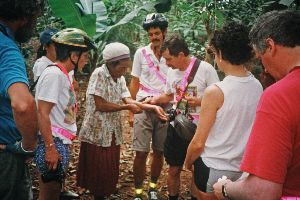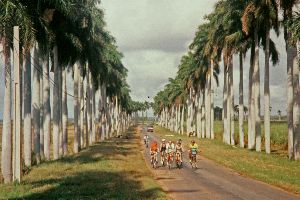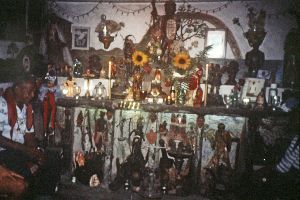| . | ||||||||||||||||||
Cuba
|
||||||||||||||||||

Pinar Del Rio Program
|

El Corazon de Cuba Program
|
 La Cuna del Espiritu de Cubano Program (Eastern Provinces) |
||||||||||||||||
Educational Program Schedule and Fees *Generally, the programs start on Saturday. Up-coming programs are:
If you would notified about future programs, send an email to: ibike (at) ibike.org and request to be kept informed about the the Cuba Educational program. Information for All Program: Structure: This is a small group, inter-disciplinary, people-to-people, educational program. It provides the participants the opportunity compare and contrast the work environment, quality of life, social programs, political structure and policies, economic policy and structure, environment and culture of Cuba, with those they are familiar with through activities and fellowship with the Cuban peoples. It is an opportunity to strengthen your knowledge to better enable you to participate in important policy discussions on a wide range of topics that affect world, national and local affairs. Day-to-day, on an ongoing basis throughout the program there will be opportunities to meet people, small group discussion with Cubans and excursions and presentations on history, architecture, culture, ethnic diversity, social systems, gender rights and roles, politics, agriculture, mining, industry, fisheries, music, language, religion, geology, botany, and ecology. To increase the people-to-people contact with Cuban society and educational value of the program, the primary modes of travel are bicycle and walking, supported by a vehicle. There is no test at the end. U.S. Status: This program operates under a General License for People-to-People Travel (no application or paperwork is required). This is covered by 31 CFR § 515.565(b). It is legal for U.S. citizen, and citizens of other country, to visit Cuba as participants on this program. For more details see FAQ. Program Fees: The fee includes deposit, accommodations (double-occupancy), two-meals a day and a variety of museums, and cultural and educational activities in Cuba. A portion of the fee is a tax-deductible donation (to the extent allowed by law) to the International Bicycle Fund. For most people the average out of pocket expenses per program is US$250 plus or minus US$150. Accommodations: Mostly private, bed and breakfast, homes (Casa Particular), with possibly some small hotels and cabanas (rustic cabins) in isolated situation. There is no tent camping. The program is based on double-occupancy. Single rooms are generally available, with a supplemental fee. The single-supplement fee is about 150CUC per program. Cuba Tourist Card (Visa): Cuba Tourist Cards are obtain in conjunction with the purchase of airline ticket to Cuba. This is covered in detail in the pre-departure materials that are provided to program participants. Each airline handles it a little differently. Support Vehicle: For most programs, there is a vehicle to carry baggage. Program activities are oriented towards participants traveling by bicycle. Meals Included: Two meals per day are included. The Cuban cuisine is centered around rice, beans, yucca and other root crops. Pork and chicken are the most common meats. A typical B&B breakfast is eggs, toast, fruit, juice and coffee. Pragmatic vegetarians and people with special diets usually manage OK. Very strict vegetarians will be challenged. When the group stays at private houses they can’t expect to have special dishes cooked for them and should bring a stash of supplements. Health and Immunizations: Bike: A sturdy bike (touring or MTB) with strong tires and wide gear range is recommended. (You might consider bring a bike that you can donate at the end of the trip. Contact us for more information.) Bike Rental: With some limitation rental bikes are available. They
are US$150/program,
Our partner, the Bicycle Club for the Environment and Culture is a Cuban non-governmental organization promoting bicycle transport and understanding between the people of Cuba and the world. |
||||||||||||||||||
|
|
"Hosted by
DreamHost - earth friendly web hosting"
|
|||||||||||||||||
